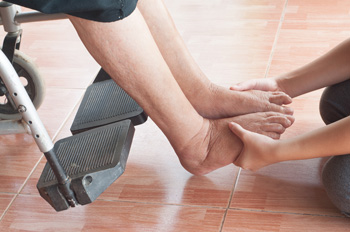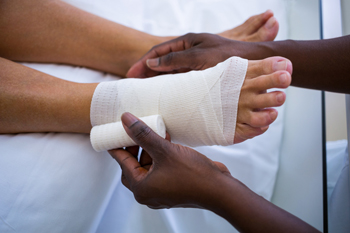Stuart (772) 223-8313Rate Us
Jupiter (561) 744-6683Rate Us
Stuart (772) 223-8313Rate Us
Jupiter (561) 744-6683Rate Us
 Many older adults suffer from swelling in the feet and ankles. This swelling can reduce mobility, make falls more likely to occur, and decrease overall comfort. Doing simple exercises can help reduce swelling in the lower limbs by helping the body pump fluids up from the feet and back into the center area of the body. Once the excess fluid is in the trunk of the body, it can be eliminated via urine. A simple exercise that you can do at home to reduce swelling in the ankles is ankle pumps. To do this exercise, lie down and elevate the feet. Moving only the feet, point your toes up towards your head, and then down away from your head. Go back and forth 30 times, completing this exercise three times per day. For more information about what you can do to reduce swelling in the lower limbs, consult with a podiatrist today.
Many older adults suffer from swelling in the feet and ankles. This swelling can reduce mobility, make falls more likely to occur, and decrease overall comfort. Doing simple exercises can help reduce swelling in the lower limbs by helping the body pump fluids up from the feet and back into the center area of the body. Once the excess fluid is in the trunk of the body, it can be eliminated via urine. A simple exercise that you can do at home to reduce swelling in the ankles is ankle pumps. To do this exercise, lie down and elevate the feet. Moving only the feet, point your toes up towards your head, and then down away from your head. Go back and forth 30 times, completing this exercise three times per day. For more information about what you can do to reduce swelling in the lower limbs, consult with a podiatrist today.
Proper foot care is something many older adults forget to consider. If you have any concerns about your feet and ankles, contact one of our podiatrists from Advanced Foot & Ankle Specialists, PA. Our doctors can provide the care you need to keep you pain-free and on your feet.
The Elderly and Their Feet
As we age we start to notice many changes in our body, but the elder population may not notice them right away. Medical conditions may prevent the elderly to take notice of their foot health right away. Poor vision is a lead contributor to not taking action for the elderly.
Common Conditions
Susceptible Infections
Diabetes and poor circulation can cause general loss of sensitivity over the years, turning a simple cut into a serious issue.
If you have any questions please feel free to contact one of our offices located in Stuart and Jupiter, FL . We offer the newest diagnostic and treatment technologies for all your foot and ankle needs.
 Patients who have experienced ankle pain are aware of the inconvenience this can cause. Daily activities can be difficult to accomplish, and mobility may be limited. There are several reasons why ankle pain may develop. These can include Achilles tendonitis, the arthritic condition that is known as gout, and ankle sprains or fractures. Some of the symptoms that are associated with ankle pain can include swelling, and it may be difficult to bend the ankle. If you are afflicted with any type of ankle pain that is from an injury or medical condition, it is suggested that you seek the counsel of a podiatrist.
Patients who have experienced ankle pain are aware of the inconvenience this can cause. Daily activities can be difficult to accomplish, and mobility may be limited. There are several reasons why ankle pain may develop. These can include Achilles tendonitis, the arthritic condition that is known as gout, and ankle sprains or fractures. Some of the symptoms that are associated with ankle pain can include swelling, and it may be difficult to bend the ankle. If you are afflicted with any type of ankle pain that is from an injury or medical condition, it is suggested that you seek the counsel of a podiatrist.
Ankle pain can be caused by a number of problems and may be potentially serious. If you have ankle pain, consult with one of our podiatrists from Advanced Foot & Ankle Specialists, PA. Our doctors will assess your condition and provide you with quality foot and ankle treatment.
Ankle pain is any condition that causes pain in the ankle. Due to the fact that the ankle consists of tendons, muscles, bones, and ligaments, ankle pain can come from a number of different conditions.
Causes
The most common causes of ankle pain include:
Symptoms
Symptoms of ankle injury vary based upon the condition. Pain may include general pain and discomfort, swelling, aching, redness, bruising, burning or stabbing sensations, and/or loss of sensation.
Diagnosis
Due to the wide variety of potential causes of ankle pain, podiatrists will utilize a number of different methods to properly diagnose ankle pain. This can include asking for personal and family medical histories and of any recent injuries. Further diagnosis may include sensation tests, a physical examination, and potentially x-rays or other imaging tests.
Treatment
Just as the range of causes varies widely, so do treatments. Some more common treatments are rest, ice packs, keeping pressure off the foot, orthotics and braces, medication for inflammation and pain, and surgery.
If you have any questions, please feel free to contact one of our offices located in Stuart and Jupiter, FL . We offer the newest diagnostic and treatment technologies for all your foot care needs.
 Diabetes is a condition that can require professional assistance in maintaining the health of the feet for those affected. It can be common for those with diabetes to develop foot ulcers. These are slow healing, deep wounds, that if left untreated, can become badly infected. Infections can lead to serious complications, and in severe cases, may require amputation. Diabetes can often affect the nerves in the feet, causing them to lose feeling, which is why many patients let their wounds go untreated. To help prevent wounds from getting infected, please consult with a podiatrist for regular screenings.
Diabetes is a condition that can require professional assistance in maintaining the health of the feet for those affected. It can be common for those with diabetes to develop foot ulcers. These are slow healing, deep wounds, that if left untreated, can become badly infected. Infections can lead to serious complications, and in severe cases, may require amputation. Diabetes can often affect the nerves in the feet, causing them to lose feeling, which is why many patients let their wounds go untreated. To help prevent wounds from getting infected, please consult with a podiatrist for regular screenings.
Wound care is an important part in dealing with diabetes. If you have diabetes and a foot wound or would like more information about wound care for diabetics, consult with one of our podiatrists from Advanced Foot & Ankle Specialists, PA. Our doctors will assess your condition and provide you with quality foot and ankle treatment.
What Is Wound Care?
Wound care is the practice of taking proper care of a wound. This can range from the smallest to the largest of wounds. While everyone can benefit from proper wound care, it is much more important for diabetics. Diabetics often suffer from poor blood circulation which causes wounds to heal much slower than they would in a non-diabetic.
What Is the Importance of Wound Care?
While it may not seem apparent with small ulcers on the foot, for diabetics, any size ulcer can become infected. Diabetics often also suffer from neuropathy, or nerve loss. This means they might not even feel when they have an ulcer on their foot. If the wound becomes severely infected, amputation may be necessary. Therefore, it is of the upmost importance to properly care for any and all foot wounds.
How to Care for Wounds
The best way to care for foot wounds is to prevent them. For diabetics, this means daily inspections of the feet for any signs of abnormalities or ulcers. It is also recommended to see a podiatrist several times a year for a foot inspection. If you do have an ulcer, run the wound under water to clear dirt from the wound; then apply antibiotic ointment to the wound and cover with a bandage. Bandages should be changed daily and keeping pressure off the wound is smart. It is advised to see a podiatrist, who can keep an eye on it.
If you have any questions, please feel free to contact one of our offices located in Stuart and Jupiter, FL . We offer the newest diagnostic and treatment technologies for all your foot care needs.
 Research has indicated that many patients who have neuropathy may be diabetic. Peripheral neuropathy is defined as nerve damage that can affect the feet, and can happen from elevated glucose levels in the blood. It can cause the inability to feel sensation, and there may be muscle weakness and slowed reflexes. Patients who have autonomic neuropathy may experience difficulty in swallowing, or have abnormal blood pressures and heart rates. Damage that is inflicted on the hips, thighs, or legs may be indicative of radiculoplexus neuropathy, and this may be linked to diabetes. An additional form of neuropathy is referred to as mononeuropathy, and this may cause difficulty in focusing the eyes. If you are experiencing weakness or a lack of sensation in your feet, it is strongly suggested that you are under the care of a podiatrist.
Research has indicated that many patients who have neuropathy may be diabetic. Peripheral neuropathy is defined as nerve damage that can affect the feet, and can happen from elevated glucose levels in the blood. It can cause the inability to feel sensation, and there may be muscle weakness and slowed reflexes. Patients who have autonomic neuropathy may experience difficulty in swallowing, or have abnormal blood pressures and heart rates. Damage that is inflicted on the hips, thighs, or legs may be indicative of radiculoplexus neuropathy, and this may be linked to diabetes. An additional form of neuropathy is referred to as mononeuropathy, and this may cause difficulty in focusing the eyes. If you are experiencing weakness or a lack of sensation in your feet, it is strongly suggested that you are under the care of a podiatrist.
Neuropathy
Neuropathy can be a potentially serious condition, especially if it is left undiagnosed. If you have any concerns that you may be experiencing nerve loss in your feet, consult with one of our podiatrists from Advanced Foot & Ankle Specialists, PA. Our doctors will assess your condition and provide you with quality foot and ankle treatment for neuropathy.
What Is Neuropathy?
Neuropathy is a condition that leads to damage to the nerves in the body. Peripheral neuropathy, or neuropathy that affects your peripheral nervous system, usually occurs in the feet. Neuropathy can be triggered by a number of different causes. Such causes include diabetes, infections, cancers, disorders, and toxic substances.
Symptoms of Neuropathy Include:
Those with diabetes are at serious risk due to being unable to feel an ulcer on their feet. Diabetics usually also suffer from poor blood circulation. This can lead to the wound not healing, infections occurring, and the limb may have to be amputated.
Treatment
To treat neuropathy in the foot, podiatrists will first diagnose the cause of the neuropathy. Figuring out the underlying cause of the neuropathy will allow the podiatrist to prescribe the best treatment, whether it be caused by diabetes, toxic substance exposure, infection, etc. If the nerve has not died, then it’s possible that sensation may be able to return to the foot.
Pain medication may be issued for pain. Electrical nerve stimulation can be used to stimulate nerves. If the neuropathy is caused from pressure on the nerves, then surgery may be necessary.
If you have any questions, please feel free to contact one of our offices located in Stuart and Jupiter, FL . We offer the newest diagnostic and treatment technologies for all your foot care needs.